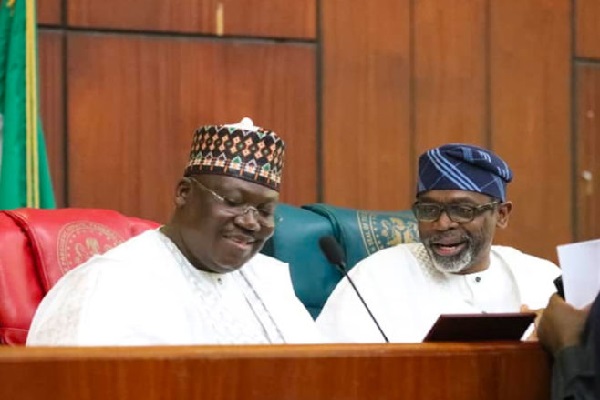Another attempt to review the 1999 Constitution will be revved up at the National Assembly when lawmakers vote on 67 bills from Tuesday.
The joint constitution review committee has proposed 67 bills – each on all the items being proposed for amendment.
The “Report of the Senate Committee on the Review of the 1999 Constitution (Fifth Alteration) Bills 2022” was laid by Deputy Senate President, Senator Ovie Omo-Agege.
Deputy Speaker of the House of Representatives, Ahmed Idris Wase, did the same at the Green Chambers.
Both the Senate and the House of Representatives will vote to adopt or reject the 67 bills proposed by the Joint Committee in the Report.
For a proposal to scale through, it must be supported by two-thirds of members.
A key item to be voted on is the Value Added Tax (VAT), which is in contention between the federal and state governments over who should be collecting it and how it should be shared.
A Federal High court judge on August 10, 2021, endorsed the Rivers State government’s prayer to start collecting VAT within its jurisdiction.
The Court of Appeal said the status quo should be maintained.
The case is now before the Supreme Court. Lagos State and others have also joined.
The lawmakers will vote on the proposal to put VAT on the Exclusive List, which will take it within the purview of only the Federal Government.
Other major items are bills on devolution of powers, local governments, legislature, judicial reform, women and vulnerable groups, institution strengthening and good governance.
Others are political parties and electoral matters, Federal Capital Territory, fundamental human rights and national security.
Lawmakers will also vote indigeneship, another flashpoint in many parts of the country.
On devolution of powers, the lawmakers will vote on six bills, such as who should establish and manage airports.
This function is presently being undertaken by the Federal Government through agencies like the police, National Identify Management Commission (NIMC) and others.
Another issue is the setting up and management of Correctional Services, Railways and National Grid System (power).
Both the Correctional Service and railways are on the Exclusive List, but lawmakers will vote on allowing states to participate in these areas.
There have been arguments that states should be allowed to build and operate prisons.
Some states have set up power generating stations but have no legal backing to transmit them.
There are eight bills on local government administration and financial autonomy.
Although there is already a constitutional provision on local government autonomy, the reverse is the case in reality as state governors have vowed not to set LGAs free.
The Supreme Court recently struck down President Muhammadu Buhari’s Executive Order 10 granting financial autonomy to state Houses of Assembly and state high courts.
They will also vote on eight bills which include financial autonomy for state legislatures and state judiciary, the procedure for overriding the President’s veto in constitution alteration, ordinary/menu bills, removal of presiding officers and pension for presiding officers of the legislature.
There are 12 bills on judicial reforms. They include bills on the establishment of the Federal Revenue Court and the revenue court of a state, timelines for determination of civil and criminal causes, the uniform retirement age of judicial officers and pension rights, judiciary (visual/remote court hearings) and the inclusion of judges of the National Industrial Court in the composition of the election tribunals.
At the moment Justices of the Supreme Court retire at age 70, the Justices of the Court of Appeal, 70 and judges of the Federal High Courts retire at 65, while state High Court judges also retire at age 65.
The bills if adopted may see Supreme Court Justices retiring at age 75, while Justices of the Appeal Court and judges of the Federal High Courts may both retire at age 70.
There are also six bills dealing with the issue of women and vulnerable groups. They include special seats for women, expansion of the scope of citizenship by registration, affirmative action for women in political party administration, amongst others.
On political parties and electoral matters, the lawmakers would be voting on three bills which include the restriction on the formation of political parties, independent candidacy and diaspora voting.
There are also three Bills regarding the Federal Capital Territory. They are: Mayoral status for the FCT, the appointment of FCT Minister and correction in the boundary of the FCT, Abuja.
The Red and the Green Chambers are not expected to vote along the same lines from next week. While the Senate may adopt particular bills, the House is at liberty to reject such bills if it so desires.
However, any discrepancy between bills adopted or rejected by any of the chambers would be resolved by a harmonisation committee soon to be set up by both chambers after the voting.
House Speaker Femi Gbajabiamila threatened to publish the names of lawmakers who are absent from proceeding during the voting.
Gbajabiamila, while speaking at the plenary yesterday, urged lawmakers to participate because of its significance to the country.
He said: “Honourable members, we will be voting on the first set of constitution amendments on March 3 and 4.
“It is important that all members should be present on Wednesday and Thursday. We will publish any name that is not present on that day.”
The proceedings were witnessed by the First Lady, Aisha Buhari.
 DailyrecordNg …Nigeria's hottest news blog
DailyrecordNg …Nigeria's hottest news blog









